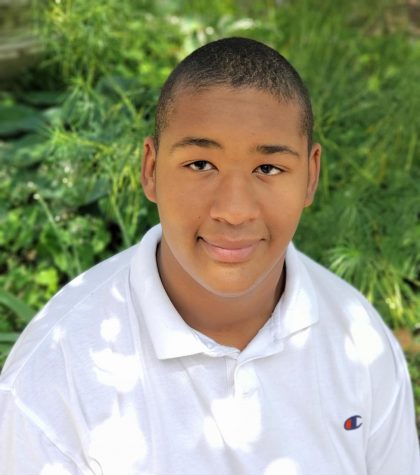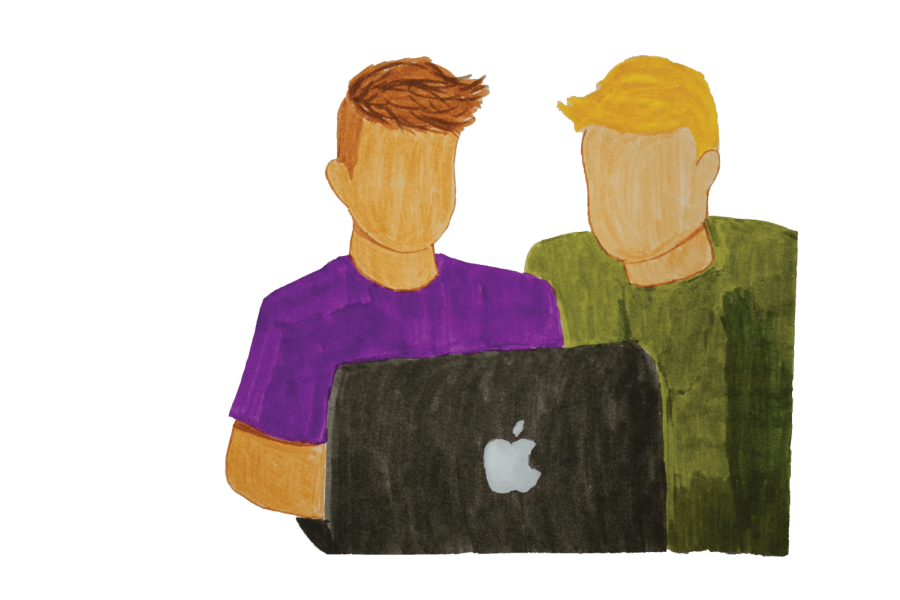Unlocking families’ DNA histories
LZ staff discovers more from taking DNA tests
Photo by Illustration used with permission of Aris Monnette
Two people looking online for a DNA test to complete. Tests cost $99 according to Ancestry DNA
In a sea of 7.4 billion people, there is and only will ever be one you. Everyone is unique; from skin color, family history, the list goes on. People receive these traits from their DNA.
With DNA laboratories such as Ancestry DNA and 23andMe, people are able to unlock more of their family history than ever before.
“I had always assumed that I was about half Irish with the [prefix] MC before my last name,” Andrew McCurley, teacher, said. “When Ancestry DNA came out about four years ago, I took the kit to find out how Irish I was, and found out that I am like 15 percent Irish which really shocked me.”
While McCurley was expecting results about being Irish, Brittney Yates, special education teacher, also received surprising news about her heredity from her DNA kit.
“Growing up, I knew I was biracial, but I knew my mom was half Italian, and so we grew up with the Italian lifestyle,” Yates said. “I took my test to find where my dad’s [ancestry] side was from. When I got my results back, I found out that I was only 14 percent Italian.”
After receiving your results from a DNA testing facility, people may be contacted if more data is found out about their heritage, or other traits, according to Ancestry DNA. For McCurley, that turned out to be the case.
“I was sitting in the MRC and I got this email saying they had updated my account,” McCurley said. “With the new data they had collected, it turns out that I dropped from 15 percent Irish to 6 percent, while [staying] 75 percent English.”
DNA tests can share a lot of different information about a person’s genetic history. Taking a DNA tests can show if a person has a chance to display certain diseases or is at an increased risk for specific genetic diseases. Other discoveries about yourself can be found from completing a DNA kit.
Yates also received more information about her health, but she said most of it is “fun stuff, like handedness” but also some more interesting things such as, “I would hate the taste of cilantro, which is not true at all. I love cilantro.”
For others, just because they do not receive the genetic information they are searching for, it does not mean people will give up timeless traditions. “I still listen to [Irish] music and play my guitar to Irish songs, but when my daughters [were in high school], I was going to have them take Irish dance,” McCurley said with a laugh. “After finding out my history, I decided I was not going to sign [my daughters] up for Irish dance lessons after all.”
Michael Cramer, world language resource aide, says he grew up ‘knowing’ his family descended from Native Americans. But then the narrative shifted.
“For years, my grandfather told us that my great-grandfather was adopted from a Native American reservation. My mother and her siblings all passed that story down my siblings and me. I always included the fact that I was 12.5 percent Native American. My uncle even looked into getting a Certificate of Degree of Indian Blood card. A couple years back, my grandfather took a genetic history test which showed he was entirely northern European and showed all of us the results at a family get-together. When my uncle asked [about] the Native American ancestry, my grandfather said he had forgotten about that story and admitted that he made up the whole thing for a laugh. [Our family] would have kept believing it if not for a genetic history test.”

As a senior, this will be Adam's third year in the journalism program, and second year of being on staff, where he is taking on the role of the Live Media...

